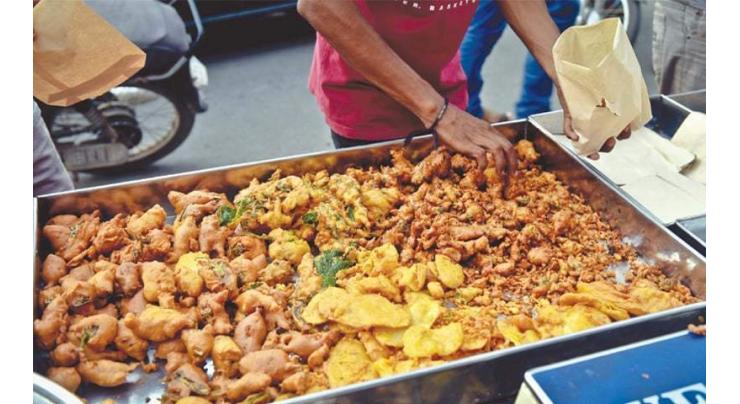
Over-consumption Of Food In Iftar Can Cause Stomach Related Diseases : Doctors Warned
Mohammad Ali (@ChaudhryMAli88) Published May 21, 2018 | 01:56 PM

Health experts are advising against over consumption of food and breaking fasts with unhealthy food as it can cause many stomach-related diseases among citizens during the month of Ramadan.
ISLAMABAD, (UrduPoint / Pakistan Point News - 21st May, 2018 ) :Health experts are advising against over consumption of food and breaking fasts with unhealthy food as it can cause many stomach-related diseases among citizens during the month of Ramadan.
Stomach ulcers and other gastro complications caused by overeating are more common during Ramadan, said a health specialist and gastroenterologist Dr Yasir Mukhtar while talking to private news channel on Monday.
"Overeating after iftar and sehri can not only harm the body, but it may also interfere with a person's spiritual growth during the month, causing fatigue, sleepiness and lethargy." Dr Yasir said fasting during the holy month can improve health but the correct diet is not always followed, and usually food habits change to overeating carbohydrates.
Other trends are overeating in a short period of time, unregulated eating and many fasters losing control and developing an uncontrolled appetite once Ramadan has finished. "They can eat anything but the most important thing is that you have to start with fluids and the food with less calories, non-fatty foods," he advised.
Health specialist said that in every holy month patients attended the emergency department with severe abdominal pains, and this year had been no exception. "With regard to the breaking of the fast, overeating and abdominal pain are very common during Ramadan," Dr says.
Patients can take several simple steps to reduce the risks of complications of gastritis while fasting. The Prophet (PBUH) as a matter of fact has emphasized the virtues of sehri the pre-dawn meal, which is either not practiced (as people find it challenging to rise in the early hours of the morning) or not observed the way that the Prophet performs it.
Dr Sheryar Amjad another health specialist said a widespread habit among Muslims is sleeping straight away after Sheri. This can result in acid reflux. Perhaps we should appreciate the virtue of another saying of the Prophet, "Delay the sehr but hasten the fast breaking.
Another common practice for many Muslims is overeating during breaking fast, followed by smoking. This bad habit indeed paves the risk of triggering dyspepsia and acid reflux for gastritis/PUD patients, he added.
Therefore, patients should be moderate when breaking their fast, eating in smaller portions, but more frequently, said, adding, for instance, start off with dates and light food before giving it a rest after maghrib prayers, followed by the main meal prior to taraweeh prayers.
He also suggested that another good practice is to stop eating three to four hours before going to bed to give the digestive system ample resting time. Hence, patients should consider minimizing the guilty pleasures of the post-taraweeh prayer meal traditionally known as "moreh".
Specialists explained try to reduce the consumption of hot, spicy and acidic-containing foods as they tend to irritate the digestive tract. Many tend not to exercise during Ramadan, preventing food from being properly digested.
"This is because of a lack of water during the day, then the time between eating and drinking when they break the fast," he said, recommending food that is high in fiber, they concluded.
Related Topics
Recent Stories

Nawaz Sharif to visit Guangzhou exhibition in China

FM Dar not traveling to China: Foreign Office

PM takes notice of deliberate delay in tax cases

Iranian President visits Allama Iqbal’s mausoleum

Iranian President arrives in Lahore today

Currency Rate In Pakistan - Dollar, Euro, Pound, Riyal Rates On 23 April 2024

Today Gold Rate in Pakistan 23 April 2024

Islam enlightened world with its teachings about knowledge: Dr Jamileh

Record London close as oil prices drop on easing Middle East fears

TV tower in Kharkiv struck as Russia captured village

LCCI language courses from May 1

Governor for service oriented governance in Punjab
More Stories From Health
-

Rawalpindi woman gives birth to six babies
4 days ago -

DC calls for intensive anti-polio drive in ICT
5 days ago -

World Hemophilia Day observed to underscore importance of providing comprehensive care
6 days ago -

Six in a family with heart on the 'right side'
6 days ago -

Diabetic disease increasing rapidly : Dr. Noor Elahi Memon
6 days ago -

World Hemophilia Day observed
6 days ago
-

ATC dismisses bail petition of doctor involved in illegal kidneys transplant
14 days ago -

Dr. Shehzad warns against deviation from WHO guidelines on anti-smoking
14 days ago -

Health activists express concerns over attempts to derail tobacco control
16 days ago -

UHS declares MBBS first prof, MS urology exam results
25 days ago -

Increased diagnostic testing for drug resistance
1 month ago -

IRD releases groundbreaking results of end TB programme
1 month ago











